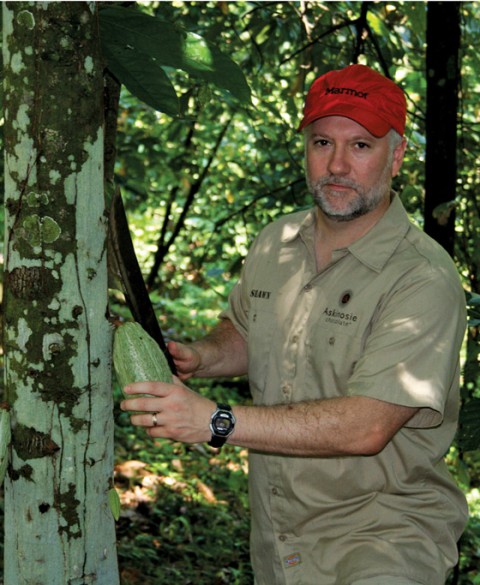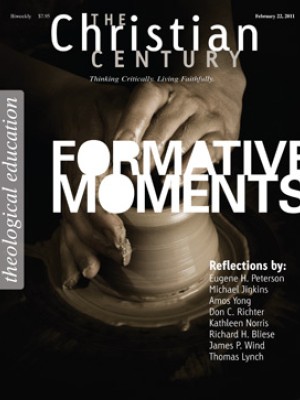On a chocolate mission: A socially conscious entrepreneur

Shawn Askinosie is the founder and owner of Askinosie Chocolate, a socially and environmentally conscious business in Springfield, Missouri. Askinosie works closely with farmers in four global regions. While producing award-winning chocolate, he seeks to create a business in which everyone involved—from farmer to factory worker to buyer—thrives.
How did you get into the chocolate business?
I was a criminal defense lawyer for 20 years and was ready for a career change. I thought about the food business because I had taken up the hobby of grilling, which turned into baking, which turned into making chocolate desserts. Especially cupcakes.
Read our latest issue or browse back issues.
I spent about five years in prayer that God would give me something else to do. I was on my way to a memorial service for a relative in 2005 when the idea came to me to make chocolate from scratch. I had been making chocolate desserts, but at that time I didn't know what "from scratch" meant. I didn't even know that chocolate came from a bean.
About three months later I was in the Amazon, traveling and learning. The first thing I did was use my skills as a lawyer to ask questions. After learning more about chocolate and making batches at home, I found a partner and started acquiring equipment for my factory, and off we went.
I have a factory and a little storefront, and we sell our chocolate to 200 specialty stores in the U.S., as well as online and all over the world.
You have said that Askinosie Chocolate was the answer to prayer. What led you to prayer in the first place?
Prayer was the only thing I knew to do for the situation I was in. I didn't know at the time how long it would take.
I was raised in the Episcopal Church. My father died of cancer when I was 14. For many reasons, I turned away from the church. I still attended, but for about 25 years I felt like I was not really there.
When I became reenlightened, I began to establish a true, honest relationship with God in a way that made me dependent on him. I started learning more about contemplative prayer and spending time at a nearby abbey, part of a Cistercian order. So prayer had become the natural thing for me to do, not just at a point of crisis. But it had only been normal for about a year or two when all of this started happening.
When I say this was an answer to prayer, I don't mean Askinosie Chocolate is God's gift to the chocolate-loving world. And I never believed that this was going to be some kind of lottery ticket for me and for my family—and it hasn't been. I make about 15 percent of what I made as a lawyer. If I knew then what I know now—had the ghost of chocolate future shown me what it was going to be like—I wouldn't have done it.
But I am grateful. I feel that God is teaching me through this business. I don't honestly feel that it belongs to me. I want to make sure that I am not holding very tightly to it, and I don't practice good works in order to make myself look good.
What did you learn when you went to the Amazon?
The first thing that struck me about the Amazon was that I had never really had an overwhelming creation experience before. I had never experienced awe in nature. We flew in on a plane and then went on a two-week walk into the forest. For the first time that I can remember, I felt really inferior to my environment. For a trial lawyer, that was pretty incredible. That experience contributed to our company's environmental awareness and our request that our farmers grow the beans in an environmentally sensitive way.
You also want your business to support social justice. How did that come about?
I have been passionate about social justice my whole life. I lived in Thailand at 19, working with the International Rescue Committee. In my law business I practiced open book management, and we shared what we had with everyone. We do the same thing now with our farmers.
The genesis of how we treat farmers was in prayer, not travel. Frankly, it is a gospel-driven component of our company. It's the same with how we relate to the surrounding area. We try to think about what we can do for the whole neighborhood.
For example, we run a "chocolate university" in which we work with children from grade school through high school, teaching them about what we do. I had a weekly program for high school students that we called a "bean to bar" program. The students' project was to help me pick a country in Africa that could be our fourth source for beans. They chose Tanzania, and we all went there together. My one requirement was that they find a woman-led farmer group. We shipped home seven metric tons of beans. This was the first time that any chocolate farmer in the world sold directly to a chocolate maker. We did that because we want to empower women entrepreneurs.
What are your sources of inspiration?
I am part of a Bible study group that has been meeting every Tuesday for 11 years. I turn to the people in that group more than anywhere else. We meet on Tuesdays because of Mitch Albom's Tuesdays with Morrie. That was the book that really broke everything down for me. I know Morrie was a religious mutt, as he calls himself, but God spoke to me through that book. God can speak through anything.
I also turn to the Sacred Space website—a contemplative prayer site run by Irish Jesuits. I also have a new app for my iPhone of Mother Teresa quotes. Come Be My Light is amazing. Unbelievable. To me it was a book about being real and being hopeful. Here's a woman who persevered through doubt. It makes me want to sell everything and go live in India.
Another book that is very meaningful to me is The Joy of Full Surrender, by Jean Pierre de Caussade, a 17th-century monk. If I had to choose one book to take with me to a desert island besides the Bible, that would be it.







